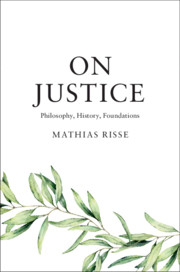Book contents
- On Justice
- On Justice
- Copyright page
- Contents
- Acknowledgments
- Introduction
- 1 Apologia for Justice
- Part I Political Philosophy
- Part II Distributive Justice
- Part III The Grounds of Justice
- 13 Engaging Immanuel Kant and Ernst Tugendhat
- 14 Value, Stringency, and the Frame-of-Human-Life Conception of the Political
- 15 The Ontology of Grounds of Justice: Elaboration and Comparisons
- 16 Grounds of Justice and Public Reason, Domestic and Global
- 17 Duties of Justice
- Epilogue on Justice, Politics, and the Meaning of Life
- Bibliography
- Index
16 - Grounds of Justice and Public Reason, Domestic and Global
from Part III - The Grounds of Justice
Published online by Cambridge University Press: 18 September 2020
- On Justice
- On Justice
- Copyright page
- Contents
- Acknowledgments
- Introduction
- 1 Apologia for Justice
- Part I Political Philosophy
- Part II Distributive Justice
- Part III The Grounds of Justice
- 13 Engaging Immanuel Kant and Ernst Tugendhat
- 14 Value, Stringency, and the Frame-of-Human-Life Conception of the Political
- 15 The Ontology of Grounds of Justice: Elaboration and Comparisons
- 16 Grounds of Justice and Public Reason, Domestic and Global
- 17 Duties of Justice
- Epilogue on Justice, Politics, and the Meaning of Life
- Bibliography
- Index
Summary
We explore the motivation for a public reason standpoint that comes from what Rawls calls the “burdens of judgment,” challenges in interpreting our moral lives that generate a plurality of interpretations. These burdens and the implied fact of reasonable pluralism motivate a public reason view. Defenders of comprehensive doctrines are not asked to abandon talk about truth or correctness, but to realize that competent reasoners invariably embrace different doctrines. This approach suits an era of global interconnectedness in the face of diversity but also faces stiff resistance. We then connect the Rawlsian account of public reason for the domestic case to the grounds-of-justice approach. The key idea is that the grounds can be understood as being included in an overlapping consensus. Then, Rawls’s construction for public reason carries over to the global level. This development of global public reason also completes the account of the political philosopher from Part I.
Keywords
- Type
- Chapter
- Information
- On JusticePhilosophy, History, Foundations, pp. 320 - 341Publisher: Cambridge University PressPrint publication year: 2020

